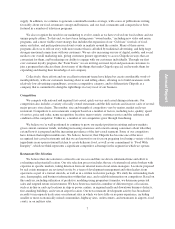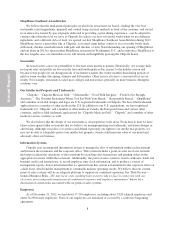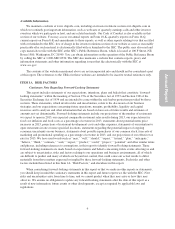Chipotle 2012 Annual Report Download - page 19
Download and view the complete annual report
Please find page 19 of the 2012 Chipotle annual report below. You can navigate through the pages in the report by either clicking on the pages listed below, or by using the keyword search tool below to find specific information within the annual report.
filed against us alleging violations of federal and state laws regarding employee wages and payment of overtime,
meal and rest breaks, employee record-keeping and related practices with respect to our employees. We could
suffer losses from, and we incur legal costs to defend, these or similar cases, and the amount of such losses or
costs could be significant. In addition, several states in which we operate and the federal government have from
time to time enacted minimum wage increases, and these increases could increase our labor costs.
We also are audited from time to time for compliance with citizenship or work authorization requirements
as well, and recent audit activity and federal criminal and civil investigations in this area are described in more
detail above under “Risks Related to Operating in the Restaurant Industry—Our business could be adversely
affected by increased labor costs or difficulties in finding the right employees for our restaurants and the right
field leaders.” Unauthorized workers may subject us to fines or penalties, and if any of our workers are found to
be unauthorized our business may be disrupted as we try to replace lost workers with additional qualified
employees. On the other hand, in the event we wrongfully reject work authorization documents, or if our
compliance procedures are found to have a disparate impact on a protected class such as a racial minority or
based on the citizenship status of applicants, we could be found to be in violation of anti-discrimination laws. We
could experience adverse publicity arising from enforcement activity related to work authorization compliance,
anti-discrimination compliance, or both, that negatively impacts our brand and may make it more difficult to hire
and keep qualified employees. Moreover, in addition to the criminal and civil investigations mentioned above
under “Risks Related to Operating in the Restaurant Industry—Our business could be adversely affected by
increased labor costs or difficulties in finding the right employees for our restaurants and the right field
leaders”, the office of the U.S. Attorney for the District of Columbia and the U.S. Securities and Exchange
Commission have informed us that they are conducting parallel investigations into possible criminal and civil
securities law violations relating to our employee work authorization compliance and related disclosures and
statements as well. All of the foregoing investigations will continue to be expensive and distracting, and could
subject us to fines, reputational damage, and other liabilities that could be significant.
The comprehensive U.S. health care reform law enacted in 2010, the Patient Protection and Affordable Care
Act, requires employers such as us to provide health insurance for all qualifying employees or pay penalties for
not providing coverage. We are evaluating the impact the new law will have on us, and although we cannot
predict with certainty the financial and operational impacts the new law will have, we expect that the requirement
that we provide more extensive health benefits to employees than we currently do could have an adverse effect
on our results of operations and financial position, as well as the restaurant industry in general. The most
significant increase in costs will likely begin in 2014. Such increases will likely be large enough to materially
impact our labor costs. Alternatively, if we choose not to provide the required health insurance or if some
employees do not qualify for the required insurance, our employee culture may be harmed and we may face
adverse publicity that negatively impacts our brand.
Additionally, while we do not currently have any unionized employees, union organizers have engaged in
efforts to organize employees of other restaurant companies. If a significant portion of our employees were to
become union organized, our labor costs could increase and our efforts to maintain a culture appealing only to
top performing employees could be impaired. Potential changes in labor laws, including the possible passage of
all or parts of the proposed Employee Free Choice Act, could increase the likelihood of some or all of our
employees being subjected to greater organized labor influence, and could have an adverse effect on our business
and financial results by imposing requirements that could potentially increase our costs, reduce our flexibility and
impact our employee culture.
Americans with Disabilities Act and Similar State Laws
We are subject to the U.S. Americans with Disabilities Act, or ADA, and similar state laws that give civil
rights protections to individuals with disabilities in the context of employment, public accommodations and other
areas. We have incurred substantial legal fees in connection with ADA-related complaints in the past, and we
may in the future have to modify restaurants, for example by adding access ramps or redesigning certain
architectural features, to provide service to or make reasonable accommodations for disabled persons under these
laws. The expenses associated with these modifications, or any damages, legal fees and costs associated with
litigating or resolving claims under the ADA or similar state laws, could be material.
17
Annual Report
























